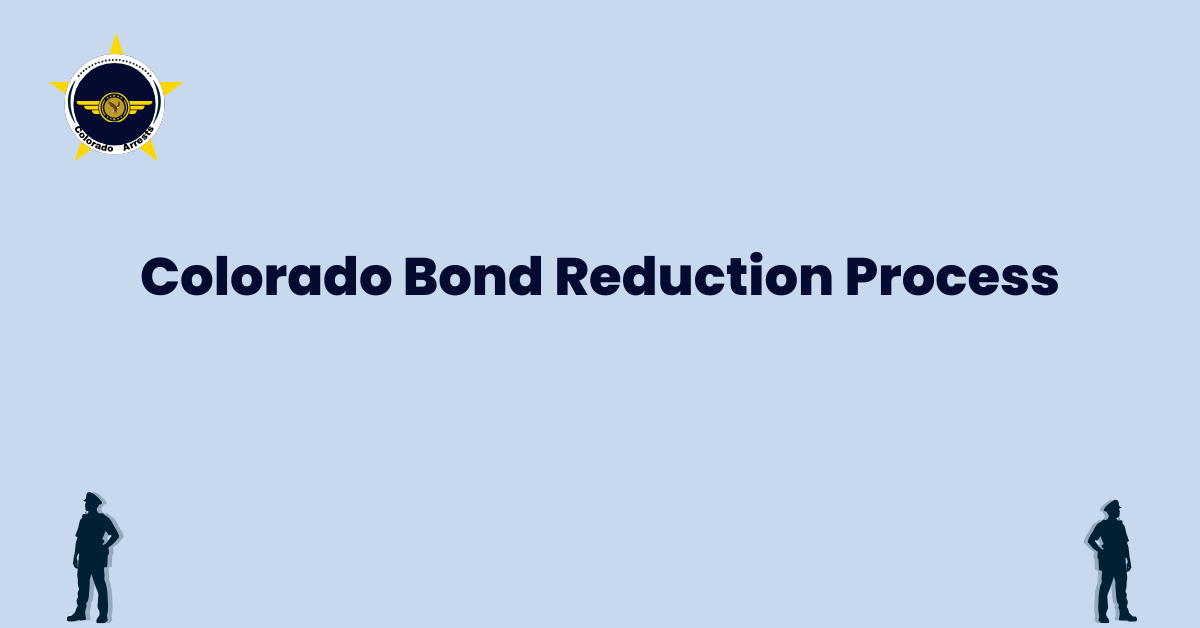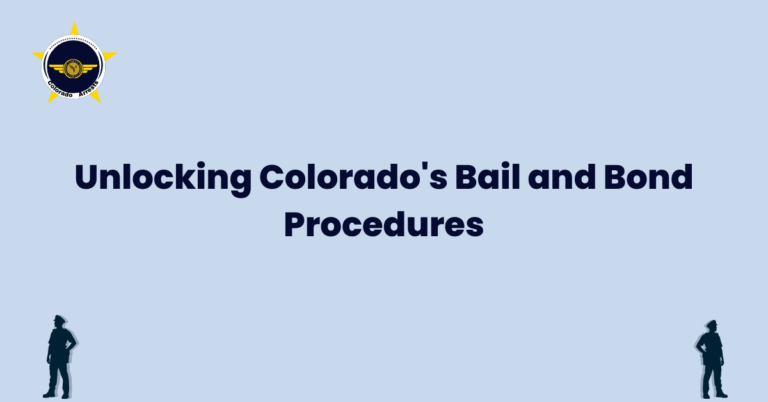Colorado Bond Reduction Process
Welcome to our informative guide on the Colorado Bond Reduction Process. If you or someone you know is facing legal troubles in the state of Colorado, understanding the bond reduction process is crucial. Whether you are a defendant, a family member, or a concerned citizen, this guide will provide you with essential information to navigate through this complex legal procedure.
In Colorado, the bond reduction process allows defendants to lower the amount of money required for their release from custody. This reduction can be significant, providing individuals with a real opportunity to secure their freedom while awaiting trial or resolution of their case.
Throughout this guide, we will discuss the steps involved in the bond reduction process, the factors considered by judges when evaluating a request, and the strategies that can increase your chances of a successful reduction. Our aim is to equip you with the knowledge necessary to make informed decisions and effectively advocate for a fair and reasonable bond reduction.
Whether you are a defendant seeking relief, an attorney representing a client, or simply someone interested in understanding the intricacies of the Colorado legal system, this guide will serve as an invaluable resource. So, let us delve into the Colorado Bond Reduction Process and empower you with the information you need to navigate this important aspect of the legal system.
Understanding the Factors Considered by Judges
When evaluating a request for bond reduction, judges take various factors into consideration. It is important to understand these factors to increase your chances of a successful reduction.
Flight Risk_ Judges will assess the likelihood of a defendant fleeing if granted a bond reduction. Factors such as past criminal history, ties to the community, and employment status can influence their decision.
Nature of the Offense_ The seriousness of the charges against the defendant is another crucial factor. Judges will consider the potential danger posed to the community and the likelihood of the defendant committing additional offenses.
Financial Situation_ The defendant’s financial situation plays a significant role in bond reduction decisions. Judges will examine the defendant’s ability to pay the reduced bond amount and whether they pose a risk to themselves or others if released.
Steps Involved in the Bond Reduction Process
The bond reduction process in Colorado involves several essential steps. Familiarizing yourself with these steps will help you navigate the process more effectively.
Filing a Motion The first step is to file a motion requesting a bond reduction. This motion should outline the reasons why the reduction is warranted and provide supporting evidence.
Court Hearing After filing the motion, a court hearing will be scheduled. During the hearing, the judge will review the motion, listen to arguments from both the defense and prosecution, and make a decision based on the presented evidence.
Presenting Evidence It is crucial to gather and present compelling evidence to support your request for bond reduction. This may include financial documentation, character references, employment records, and any other relevant information.
Strategies for a Successful Bond Reduction
While each case is unique, there are strategies that can increase your chances of a successful bond reduction. Here are a few key strategies to consider
Engage an Experienced Attorney Working with an experienced attorney who specializes in bond reduction cases can significantly enhance your chances of success. They will have the knowledge and expertise to guide you through the process effectively.
Present a Strong Case Building a strong case is crucial. Collect all necessary evidence, such as proof of employment, community ties, and any other factors that demonstrate your commitment to appearing in court and abiding by the law.
Show Remorse and Rehabilitation Expressing genuine remorse for your actions and demonstrating efforts towards rehabilitation can positively impact the judge’s perception of you. This can be achieved through counseling, community service, or other proactive measures.
Empowering Yourself with Knowledge
The Colorado Bond Reduction Process can be complex and overwhelming, but with the right information, you can navigate it successfully. This guide aims to provide you with the knowledge necessary to make informed decisions and effectively advocate for a fair and reasonable bond reduction.
By understanding the factors considered by judges, the steps involved in the process, and the strategies for success, you can approach the bond reduction process with confidence and increase your chances of securing your freedom while awaiting trial or case resolution.
Remember, whether you are a defendant seeking relief, an attorney representing a client, or someone interested in understanding the Colorado legal system, this guide is designed to be an invaluable resource for you. Let us empower you with the information you need to navigate this important aspect of the legal system.
FAQs
What is the bond reduction process in Colorado?
The bond reduction process in Colorado allows defendants to lower the amount of money required for their release from custody. This reduction can be significant, providing individuals with a real opportunity to secure their freedom while awaiting trial or resolution of their case.
Who is eligible for a bond reduction in Colorado?
Any defendant who has been granted bail and is currently in custody can apply for a bond reduction in Colorado. However, it is important to note that the decision to grant a reduction rests solely with the judge overseeing the case.
What factors do judges consider when evaluating a bond reduction request?
Judges consider various factors when evaluating a bond reduction request in Colorado. These factors may include the seriousness of the charges, the defendant’s criminal history, their ties to the community, the risk of flight, and the potential danger they may pose to the community.
How can I increase my chances of a successful bond reduction?
There are several strategies you can employ to increase your chances of a successful bond reduction in Colorado. These include providing strong evidence of your ties to the community, demonstrating that you are not a flight risk, and presenting a compelling argument for why a reduction is necessary and fair in your case.
Can I represent myself during the bond reduction process?
While it is possible to represent yourself during the bond reduction process, it is highly recommended to seek the assistance of an experienced attorney. An attorney can navigate the complex legal procedures, gather necessary evidence, and present a strong case on your behalf, increasing your chances of a successful bond reduction.
Is the bond reduction process the same for all types of cases in Colorado?
No, the bond reduction process may vary depending on the type of case and the specific circumstances involved. It is important to consult with an attorney who specializes in your type of case to ensure you understand and follow the correct procedures for requesting a bond reduction.







